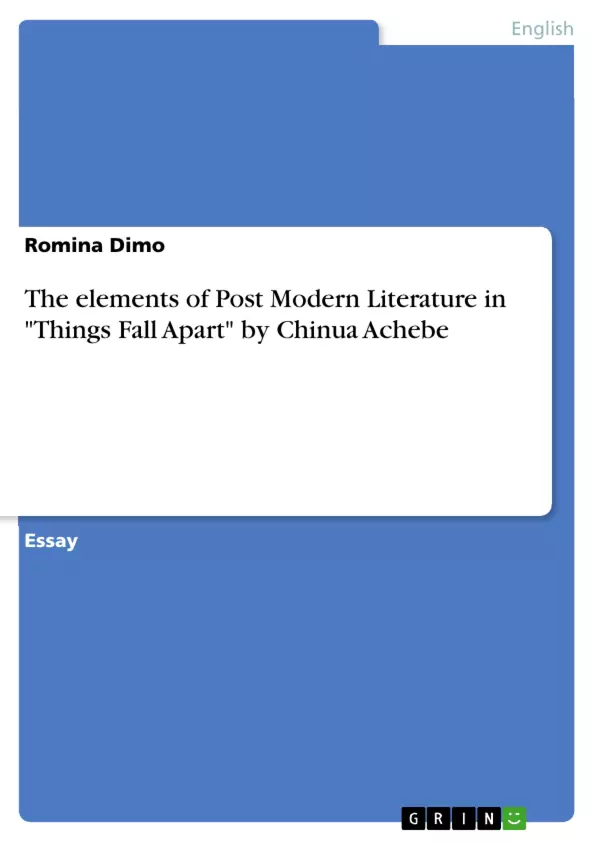Despite fateful situations, at the end of the 20th century postmodernist literature was developed. This type of literature deals more with the psychology of characters and also the readers, reflect the bitter reality of the time and was more characterized by pessimism. If modernist writers at the end of the day, see a light at the end of the tunnel, this did not happen with post-modernist writers. In this essay, I will make an analysis of the elements of this literature, in one of Chinua Achebe's most famous works, "Things Fall Apart".
Table of Contents
- Pastiche, Intertextuality and History
- Metafiction
- Irony
- Fragmented Characters
- Hyperreal
Objectives and Key Themes
This essay aims to analyze the presence of Post Modern Literature elements in Chinua Achebe's novel, Things Fall Apart, with a particular focus on the main character, Okonkwo.
- Postmodern Literature elements in Things Fall Apart
- The character of Okonkwo as a representation of postmodernist themes
- The clash between traditional Nigerian culture and British colonialism
- The use of intertextuality and pastiche in the novel
- The exploration of irony and fragmented characters
Chapter Summaries
The essay begins by exploring the concept of pastiche and its connection to intertextuality and historical references within Things Fall Apart. The author highlights the use of William Butler Yeats's poem "The Second Coming" to illustrate the themes of societal breakdown and the inability to hold onto traditional values.
The essay then delves into the use of metafiction in the novel, showcasing how Achebe employs symbolic language to portray the arrival of British colonial forces. The author analyzes the use of locusts as a metaphor for the overwhelming presence of British influence.
Further exploring the elements of Post Modern Literature, the essay examines the role of irony within the novel. The author analyzes how Okonkwo's attempts to reject his father's perceived weaknesses ultimately lead him to a tragic fate. The author also highlights the irony of Ikemefuna's sacrifice, showcasing how the act intended to foster peace ultimately contributes to Okonkwo's downfall.
Keywords
The main keywords and focus topics of the essay include: postmodern literature, Things Fall Apart, Chinua Achebe, Okonkwo, pastiche, intertextuality, metafiction, irony, fragmented characters, hyperreal, traditional Nigerian culture, British colonialism.
Frequently Asked Questions
What is the main objective of the essay on "Things Fall Apart"?
The essay aims to analyze postmodern literary elements within Chinua Achebe's novel "Things Fall Apart," focusing specifically on the character of Okonkwo.
How is intertextuality used in "Things Fall Apart" according to the analysis?
Achebe uses intertextuality by referencing William Butler Yeats's poem "The Second Coming" to highlight themes of societal breakdown and the loss of traditional values.
What role does irony play in the story of Okonkwo?
Irony is central to Okonkwo's fate; his intense desire to avoid his father’s perceived weaknesses and his violent rejection of change ultimately lead to his tragic downfall.
What postmodern elements are identified in the novel?
The essay identifies elements such as pastiche, intertextuality, metafiction, irony, fragmented characters, and the concept of the hyperreal.
How does the essay interpret the metaphor of the locusts?
The arrival of locusts is analyzed as a metafictional metaphor for the overwhelming and destructive arrival of British colonial influence in Nigeria.
What is the difference between modernist and postmodernist writers according to the abstract?
While modernist writers often see a "light at the end of the tunnel," postmodernist writers are characterized by a deeper pessimism and a focus on the bitter reality and psychology of the time.
- Citar trabajo
- Romina Dimo (Autor), 2020, The elements of Post Modern Literature in "Things Fall Apart" by Chinua Achebe, Múnich, GRIN Verlag, https://www.grin.com/document/916791



